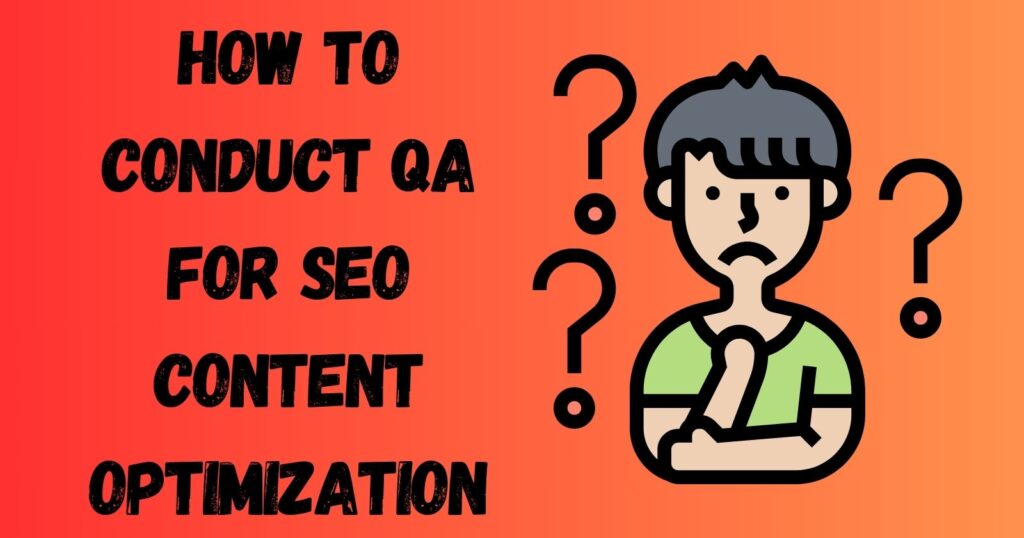
In the dynamic realm of digital marketing, ensuring your content is optimized for search engines is crucial for achieving higher rankings and driving traffic. Quality Assurance (QA) for SEO content optimization involves a systematic approach to verify that your content meets SEO best practices and delivers value to your audience. This article will guide you through the essential steps for conducting effective QA for SEO content and answer some frequently asked questions about the process.
Steps for QA in SEO Content Optimization
1. Keyword Research Validation
Before diving into content QA, verify that the keywords integrated into the content are relevant and effective. This involves:
- Checking Keyword Relevance: Ensure the keywords align with the target audience’s search intent.
- Assessing Keyword Placement: Keywords should be strategically placed in titles, headings, and throughout the content while avoiding keyword stuffing.
- Analyzing Competitor Keywords: Compare your keywords with those used by top competitors to identify any gaps.
2. Content Structure Review
A well-structured content piece enhances readability and SEO. During the QA process, check for:
- Proper Use of Headings: Ensure headings (H1, H2, H3) are used appropriately to break up content and include relevant keywords.
- Readability and Flow: Content should be easy to read and logically organized.
- Internal and External Links: Verify that links are functional and relevant, providing additional value to the reader.
3. On-Page SEO Elements Check
On-page SEO elements are crucial for search engine visibility. Your QA should include:
- Meta Titles and Descriptions: Ensure these elements are compelling, relevant, and include primary keywords.
- Alt Text for Images: Verify that images have descriptive alt text containing relevant keywords.
- URL Structure: URLs should be clean, descriptive, and include targeted keywords.
4. Content Quality and Relevance
Content should be both engaging and informative. Assess the following:
- Originality: Ensure the content is original and free from plagiarism.
- Accuracy: Verify that all facts, statistics, and claims are accurate and up-to-date.
- Engagement: Evaluate whether the content is engaging and provides value to the reader.
5. Technical SEO Considerations
Technical aspects can impact SEO performance. During QA, check:
- Mobile-Friendliness: Ensure the content is optimized for mobile devices.
- Page Load Speed: Assess and optimize page load times to enhance user experience.
- Schema Markup: Implement schema markup to help search engines understand the content better.
6. Analytics and Performance Metrics
Review performance metrics to gauge the effectiveness of your content:
- Traffic Analysis: Monitor traffic sources and behavior to see how well the content attracts and retains visitors.
- Engagement Metrics: Check metrics like bounce rate, time on page, and social shares to assess engagement.
Conclusion
Conducting QA for SEO content optimization is a vital process to ensure your content is optimized for search engines and delivers value to your audience. By focusing on keyword research, content structure, on-page SEO elements, content quality, and technical aspects, you can enhance the effectiveness of your content. For those seeking in-depth knowledge and skills in this area, a digital marketing institute in Jodhpur, Ghaziabad, Lucknow and all over India offers a valuable opportunity to learn and excel in SEO content optimization.
FAQ
What is the importance of QA in SEO content optimization?
QA in SEO content optimization ensures that content not only meets SEO best practices but also delivers value to the audience. This process helps in improving search engine rankings, enhancing user experience, and achieving better overall performance.
How often should SEO content be reviewed?
SEO content should be reviewed regularly, ideally every 3-6 months. This allows you to update outdated information, optimize for new keywords, and ensure continued relevance in search results.
What tools can assist in SEO content QA?
Several tools can assist in SEO content QA, including:
- Google Analytics: For performance metrics.
- Yoast SEO: For on-page SEO checks.
- Screaming Frog SEO Spider: For technical SEO audits.
- Grammarly: For content quality and grammar checks.
How can a Digital Marketing Institute in Jodhpur help with SEO content optimization?
A Digital Marketing Institute in Jodhpur can provide valuable training and resources on SEO best practices, content creation strategies, and the latest industry trends. Enrolling in such an institute can enhance your skills and ensure you are equipped with the knowledge to effectively conduct QA for SEO content optimization.
